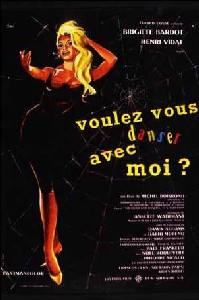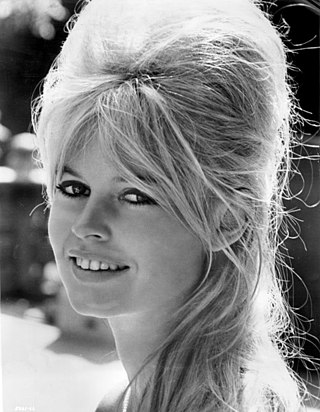
Brigitte Anne-Marie Bardot, often referred to by her initials B.B., is a French former actress, singer, and model as well as an animal rights activist. Famous for portraying characters with hedonistic lifestyles, she is one of the best known symbols of the sexual revolution. Although she withdrew from the entertainment industry in 1973, she remains a major pop culture icon. She has acted in 47 films, performed in several musicals, and recorded more than 60 songs. She was awarded the Legion of Honour in 1985.

Serge Gainsbourg was a French singer-songwriter, actor, composer, and director. Regarded as one of the most important figures in French pop, he was renowned for often provocative releases which caused uproar in France, dividing public opinion. His artistic output ranged from his early work in jazz, chanson, and yé-yé to later efforts in rock, zouk, funk, reggae, and electronica. Gainsbourg's varied musical style and individuality make him difficult to categorise, although his legacy has been firmly established and he is often regarded as one of the world's most influential popular musicians.

Roger Vadim Plemiannikov was a French screenwriter, film director and producer, as well as an author, artist and occasional actor. His best-known works are visually lavish films with erotic qualities, such as And God Created Woman (1956), Blood and Roses (1960), The Game Is Over (1966), Barbarella (1968), and Pretty Maids All in a Row (1971).

Sylvia Lopez was a French model and actress.

Anita Louise Lane was an Australian singer-songwriter who was briefly a member of the Bad Seeds with Nick Cave and Mick Harvey and collaborated with both bandmates. Lane released two solo albums, Dirty Pearl (1993) and Sex O'Clock (2001).

Contempt is a 1963 French New Wave drama film written and directed by Jean-Luc Godard, based on the 1954 Italian novel Il disprezzo by Alberto Moravia. It stars Brigitte Bardot, Michel Piccoli, Jack Palance, Fritz Lang, and Giorgia Moll.
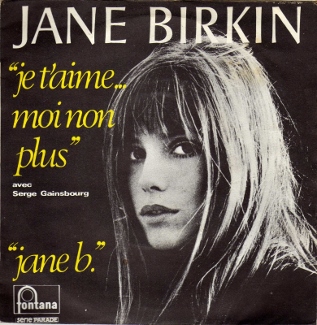
"Je t'aime... moi non plus" is a 1967 song written by Serge Gainsbourg for Brigitte Bardot. In 1969, Gainsbourg recorded the best known version as a duet with English actress Jane Birkin. Although this version reached number one in the UK—the first foreign-language song to do so—and number two in Ireland, it was banned in several countries due to its overtly sexual content.

Please, Not Now! (original French title La Bride sur le cou, is a French comedy film released in 1961, directed by Roger Vadim and starring his former wife, Brigitte Bardot.

A Very Private Affair is a 1962 French romantic drama film directed by Louis Malle and starring Brigitte Bardot.

Long Live Maria! is a 1965 adventure comedy film starring Brigitte Bardot and Jeanne Moreau as two women named Maria who meet and become revolutionaries in the early 20th century. It also starred George Hamilton as Florès, a revolutionary leader. It was co-written and directed by Louis Malle, and filmed in Eastman Color. The costumes were by Pierre Cardin.

Here Come the Girls is a 1953 musical comedy film directed by Claude Binyon, filmed in Technicolor, produced by Bob Hope's company Hope Productions Inc., and released by Paramount Pictures.

Mio figlio Nerone, released in the US as Nero's Mistress is a 1956 Italian historical comedy film directed by Steno and starring Alberto Sordi, Vittorio De Sica, Gloria Swanson and Brigitte Bardot, with cinematography by Mario Bava. It depicts a visit by the Roman Emperor Nero and his entourage to a coastal villa.

Philippe Nicaud was a French actor and singer, was married to Christine Carère from 1957 till her death in 2008.
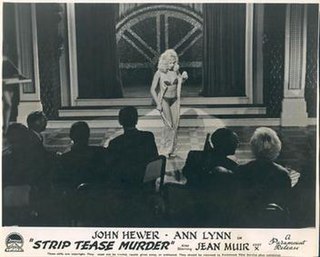
Strip Tease Murder is a low budget 1961 British second feature film thriller directed by Ernest Morris and starring John Hewer and Ann Lynn. It was written by Paul Tabori and produced by The Danzigers.

Babette Goes to War is a 1959 French CinemaScope film starring Brigitte Bardot. It was Bardot's first movie since becoming a star where she did not take off her clothes.

The Intruder is a 1999 psychological thriller directed by David Bailey from a screenplay by Jamie Brown, based on the novel of the same name by Brooke Leimas. It stars Charlotte Gainsbourg as a woman who suspects she is being stalked, possibly by her husband's first wife, who was murdered three years ago.

Murder on the Orient Express is a 2017 mystery film co-produced and directed by Kenneth Branagh from a screenplay by Michael Green, based on the 1934 novel of the same name by Agatha Christie. The film stars an ensemble cast with Branagh as Hercule Poirot, alongside Tom Bateman, Penélope Cruz, Willem Dafoe, Judi Dench, Johnny Depp, Josh Gad, Derek Jacobi, Leslie Odom Jr., Michelle Pfeiffer, and Daisy Ridley. The plot follows Poirot, a world-renowned detective, as he investigates a murder on the luxury Orient Express train service in the 1930s.
Christian Gérard Mazas, known as Christian-Gérard, was a French stage and film actor as well as theater director.
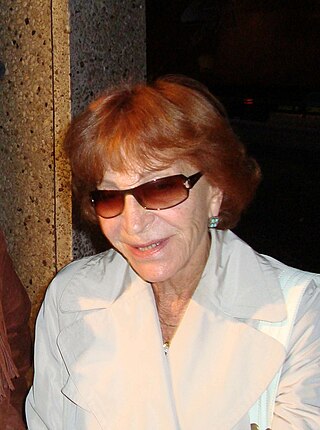
Maria Pacôme was a French actress and playwright.
